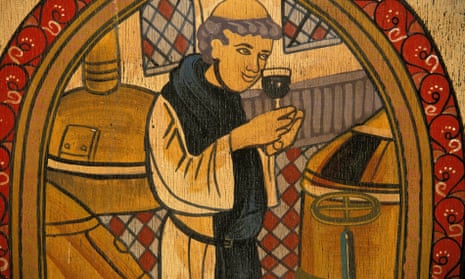As keepers of one of only 14 abbeys in the world producing Trappist beer, the monks of Notre-Dame de Saint-Rémy, in Rochefort, are dogged defenders of the purity of the spring water from which it is made.
A long-running attempt by one of Belgium’s richest families, the Lhoist-Berghmans, to lower the area’s groundwater level to help prolong the life of their local lime quarry business has been fought against hard by the monks in the courts. But, until now, there has been no suggestion of any sin.
That appears to have changed. Following a decision last December by the Walloon regional administration to allow the mining company Lhoist to test if similarly pure waters could be pumped from deeper aquifers to satisfy the monks, the abbey has formally claimed that the civil servant who granted the permit has shown bias.
One allegation by the brothers is that the official sought confirmation from the International Trappist Association that the conditions for obtaining the Trappist label are not related to the quality of the water used.
With the first test pumping set to start in mid-May, the monks are seeking to have the official removed from the case. A second claim, that there should be EU protection from the pumping, has been made in a civil court in the city of Namur.
The saga began a decade ago when the Lhoist company announced its plans to deepen the Boverie quarry in Rochefort, south Belgium, to extend its life from 2022 to 2045. The firm employs about 150 local people.
By drilling 60 metres further down, the existing groundwater table, known as the Tridaine, from which the monks and the town source their drinking water, would be partially destroyed.
Lhoist offered to pay for the installation of pumps to release water from deeper aquifers, an irreversible move that the monks think will affect the taste of their beer. The abbey, which started making beer in 1797, fears that even the test pumping will damage the sensitive ecosystem.
Luc Deprez, acting for the monks, told the Belgian newspaper De Morgen: “The water that Lhoist will pump up is not drinkable.”
The manager of the quarry, Geoffroy Fiévet, said this was not the case and that the monks had agreed to test the waters in 2008, only to later change their minds.
“The only way to keep the quarry open for longer is to dig deeper,” he said.
During a recent drought, Lhoist was able to pump up fresh pure water for residents. However it is facing a challenge to win sympathy for its cause.
“It is an incredibly complex matter that is hard to explain,” Fiévet said. “And of course people choose the side of the abbey and not the quarry. Nobody knows about lime, but everyone likes a Trappist.”
Only beers made by an abbey under the supervision of monks who live in near silence under the rule of Saint Benedect are allowed to be described as Trappist.
